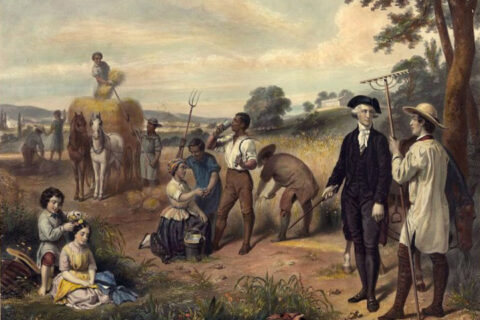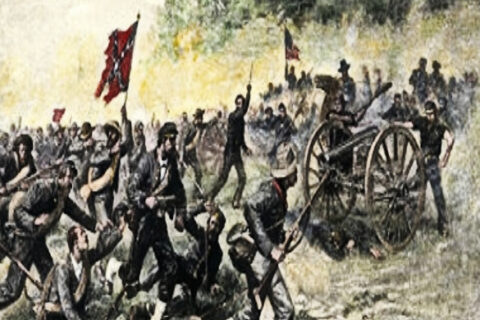So, Robert E. Lee’s pleas for his fellow countrymen to help bind the nation’s wounds fell on many deaf ears, and the South responded to Reconstruction by developing a cult – it’s called the Lost Cause. And it still exists today. Fortunately it’s declining, but it still exists.
Sherman, of course, is known as the Father of Total War; he was a man who believed that it was not the Southern armies we have to beat, it is the Southern will to resist that we have to conquer. And he knew this out of his love for the South.
Please believe me, dear reader, when I say it pained me to have to write the article you are hopefully about to read. The reasons for which it pained me to have to write it will naturally come out as the article unfolds, but I knew, as soon as I’d finished watching this video on YouTube in the wee hours a couple of weeks ago, that my conscience would force me to write the article eventually, no matter how unpleasant the task; that I’d literally lose sleep until I did write and submit it for publication here at our little oasis and corner of the interwebz. And here we are, several precious hours of sleep lost later. Whew!, glad that’s finally over. Now I can catch back up on my “beauty rest,” and Lord knows I need all the beauty rest I can get in my advancing age! But anyway:
The statements in my above-posted epigraphs were both made within about a ten-minute span of time at the Virginia Civil War Sesquicentennial Celebration, by Prof. James “Bud” I. Robertson Jr., a likable and well-respected “Civil War” historian and native of Virginia. I encourage you all to watch the video in full and to listen attentively to Dr. Robertson’s well-given presentation; he was an excellent storyteller, and like any good storyteller generally does, our good professor tells a few humorous “zingers” at the beginning of and throughout his presentation titled, After the Civil War.[1] I said that Dr. Robertson was (past tense) a good storyteller because he departed from this life Nov. 2, 2019, so is unfortunately no longer with us. RIP, dear Sir.
You’ve probably figured out by now that I respectfully, yet vehemently, disagree with the latter parts of both of Prof. Robertson’s statements above-quoted. I wish he were here today to defend himself and those assertions against my rebuttals, but that he isn’t means I’m forced to “speak ill of the dead” in a certain sense, and doing so goes against all I was taught in my formative years, and my very nature itself. Although, I have no trouble speaking ill of savage monsters like General Sherman et al, but that’s an entirely different matter that I’ll touch on a bit below.
I can’t rightly explain why I was taken aback by those … effusions when Prof. Robertson uttered them in the video, except to say that I was really beginning to grow fond of the old guy in the twenty to thirty minute span that elapsed leading up to them. Be that as it may, I can hardly see how any true son or daughter of the South considers it a good thing that Lost Cause orthodoxy and knowledge thereof is in a state of decline amongst Southerners. Moreover, that was probably true when the good professor made the statement, but I believe (and to Prof. Robertson’s horror were he still with us, no doubt) it’s on the rebound now, seven years down the road and with events like Charlottesville etc. behind us. For my own part, that is a good thing – not what happened to our people at Charlottesville, but what has slowly but surely been happening in its aftermath. Namely, and in part, the revival of Lost Cause orthodoxy and its popularity amongst true Southerners.
I said above that you should take time to watch Prof. Robertson’s hour-long presentation in full. As such, I don’t want to spoil any part of it for those of you who intend to do so. That said, consider well the three undergirding tenets of Lost Cause orthodoxy Prof. Robertson names, and ask yourself what is untruthful and/or objectionable about any of them, or any combination of them, as such. Again, I just don’t get where the good professor is coming from on the point. We all know, for example, that no. 1 is not the *only* reason the Confederates lost the war, but we have it on credible and reliable authority that it was certainly a deciding factor, especially by war’s end, and is therefore a perfectly truthful and legitimate tenet of Lost Cause orthodoxy. I could say similar things about the remaining two, but, once more, I don’t want to spoil it anymore than I already have for anyone. We can discuss the several tenets and their legitimacy/illegitimacy in the comments if you like.
As far as the savagery General Sherman ordered, presided over, and inflicted on the South out of his personal “love for the South,” well, I mean, that assertion leaves me almost speechless. Almost. Once again, I repeat that I do not wish to spoil it for any of you who intends to watch the video in full, but also consider well Prof. Robertson’s explanations for that assertion, and ask yourself how any of it, or all of it combined for that matter, proves, or even remotely indicates, that General Sherman loved the South, or that he did what he did out of love for the South. I don’t believe for a second that General Sherman loved the South, nor that he loved the “Glorious Union,” for that matter. That anyone does believe that simply baffles me. General Sherman loved General Sherman and all the trappings of this world and this world system; he was a servant of the god of this world system, which is explanation enough for why he had no qualms whatever with breaking every commandment in the decalogue on a regular basis. He was a horrible man and a horrible person. May his soul suffer everlasting torment! But enough about him already.
I’ll close out this little write-up by saying of Dr. Robertson, and with all due respect to his person, his credentials, and his memory, that I think he thought that it were better for the country as a whole (the good ol’ U.S. of A.) if the South acted “the bigger person” and the account of our fathers and mothers of The Southern Cause and Conduct in the War Between the States were simply forgotten and expunged from the record. Of course, to accomplish that means that we Southerners must never again allow (to borrow from Huxley) ‘the slaying of the north’s beautiful theory of the war by the introduction of mere facts.’ Well, I don’t know about you, but “to hell with that,” is what I say. And, again, I say it with all due respect to the memory of Dr. Robertson. Rest in Peace, dear Sir.
[1] Dr. Robertson also wrote a book by the same title.







And to think that the UDC guide at Jackson’s headquarters in Winchester told me that Robertson’s biography of Jackson was the best! It’s one I haven’t read and now I think I’ll erase it from my to-read bucket list. I’ll stick with Richard Weaver’s observation:
“It is good for everyone to ally himself at one time with the defeated and to look at the “progress” of history through the eyes of those who were left behind. I cannot think of a better way to counteract the stultifying “Whig” theory of history, with its bland assumption that every cause which has won has deserved to win, a kind of pragmatic debasement of the older providential theory. The study and appreciation of a lost cause have some effect of turning history into philosophy. In a sufficient number of cases to make us humble, we discover good points in the cause which time has erased, just as one often learns more from the slain hero of a tragedy than from some brassy Fortinbras who comes in at the end to announce the victory and proclaim the future disposition of affairs. p. 39.
The process will compel any honest seeker to see that the lines of social and political force are far more secret than the modern world has any mind to recognize, and that if it does not lead him to some kind of faith, it will lead him safely away from the easy constructions of those who do not wish to understand, beyond grasping what can be turned to serve a practical purpose. Whereas conventional schoolbook history leaves men cocksure and ignorant, this multidimensional kind ought to leave them filled with wonder. This kind of detachment, produced by a suppression of the instinct to be arbitrary, seems to me a requirement for understanding the human condition.” p. 40.
Richard Weaver, ‘Up from Liberalism’
Prior to watching Prof. Robertson’s presentation, I had never even heard of the man, nor of any of the books he authored; after watching it I did some research on him, and the book titles came up in my research of course. I read somewhere a similar view of his Jackson biography, although, if memory serves, it was said in that rendition that it is the “premier” Jackson biography, or at least considered such (by “scholars” I guess). I should imagine that means (to the persons who make the claim) that it is better even than Dr. Dabney’s Jackson biography. Which I have a hard time believing, but I might go ahead read Prof. Robertson’s just out of curiosity.
That is a wonderful quotation from Richard Weaver’s book. I think I’ll stick to it too.
Thanks for the comment.
Liked the article but can’t see the Lost Cause being on the rebound
Yeah, “rebound” is not a very good word for what I believe is actually happening in this vein “slowly but surely”; should have chosen a more accurate descriptive. Glad you liked the article, though. Thanks for both the compliment and the criticism, sir.
If the”Lost Cause” is sovereignty, then it is explicitly on the rise. It is happening in little pieces right now, only seen if your looking. It will happen all at once, and over time.